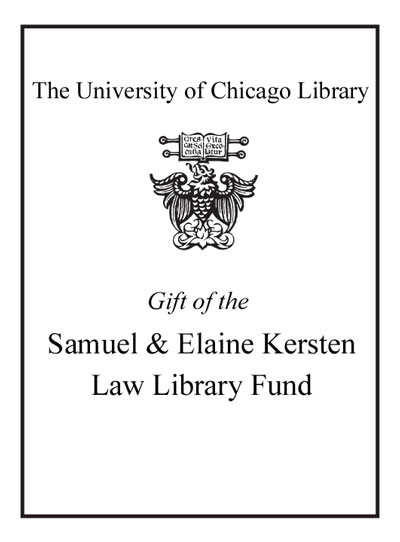Self-determination of peoples and plural-ethnic states in contemporary international law : failed states, nation-building and the alternative, federal option /
Saved in:
| Author / Creator: | McWhinney, Edward. |
|---|---|
| Imprint: | Leiden ; Boston : Martinus Nijhoff Publishers, 2007. |
| Description: | vii, 133 p. ; 25 cm. |
| Language: | English |
| Subject: | |
| Format: | Print Book |
| URL for this record: | http://pi.lib.uchicago.edu/1001/cat/bib/6490837 |
Table of Contents:
- Preface: The National and International Faces of Federalism
- Chapter I. Self-determination of Peoples as United Nations Principle. Historical Roots and Contemporary International Law/Municipal (Constitutional) Law Antinomies
- A. Historical Origins of the Self-determination Principle
- B. Self-determination as International Law and Municipal (Constitutional) Law principle
- Chapter II. Emergence of States in Classical International Law
- A. The doctrine of Recognition in its Declaratory and Constitutive Variants. Declaratory and Constitutive Theories of Recognition
- B. British practice: Russian Revolution Cases
- C. British practice: the Ethiopian War and Spanish Civil War cases
- D. Post-World War II: Yalta, Potsdam and the Cold War
- E. Post-decolonization Succession States
- F. Latin American practice: The Estrada Doctrine
- G. British practice: The Declaratory Policy of Recognition
- H. The Balkans. Dilemmas and Contradictions in Contemporary State Policies on Recognition
- I. European Community Guidelines on Recognition. (1991)
- J. Opinions of the Badinter Commission (1991-1992)
- Chapter III. The United Nations Charter and Admission of States, and also their Exclusion
- A. Admission to functionally-based or regionally-based International Organizations
- Chapter IV. The United Nations Charter Principle of Territorial Integrity of States. The Uti Possidetis Doctrine as Element in State Succession
- A. The uti possidetis doctrine
- Chapter V. Federalism and Constitutional Pluralism as Self-Determination options for Plural-ethnic States. The Different Faces of Federalism in Comparative Constitutional Law
- A. Self-determination and Self-government for Indigenous. Aboriginal peoples
- B. Classical, Anglo-Saxon Federalism and the Deux Nations (Compact) Theory of Federalism
- C. Dilemmas and Contradictions within Classical. Juridical Federalism
- D. Federalism and the New Pluralism: Re-defining the Constitutional Game and the Players
- E. Pragmatic Accommodations: The Trial-and-error of Classical Federalism
- F. New Thinking on Federalism: New Plural-constitutional Options
- G. United Nations Initiatives for Federal Solutions for the Former Yugoslavia
- Chapter VI. Law and Politics and the Dialectical Unfolding of the Self-Determination Principle
- A. The role of the Legal Advisor
- B. Resume: New Thinking on Recognition and State Succession
- Chapter VII. Excursus. Failed States: The Trial-and-error of Contemporary Exercises in Constitution-making and Nation-building
- A. Yugoslavia: political implosion of uni-national, multi-cultural state
- B. Palestine: Self-determination and State Succession dilemmas for the former British Mandated territory
- C. Iraq: Dance of the Green Table: The legacy of Sykes and Picot
- D. "Quebecois" as "Nation" within Canada
- 1. Need for prior representative (multilateral) international consensus
- 2. Importance of Timing to success or failure
- 3. Local political-legal elite: incorporation into government for defeated countries
- 4. "Reception" of foreign constitutional-governmental institutions and processes: limits and possibilities
- 5. Constitution-making and Nation-building: opportunities and pitfalls
- Note on the Author
- Author's Publications
- Index

